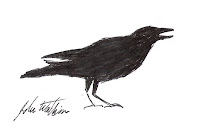The cultural significance of crows
by John MacBeath Watkins
Jamie's wonderful posts on crows set me to thinking about the cultural significance of crows. Think of how few songs there are about crows, or even corvidae in general. "Jimmy crack corn," in the song sometimes called "blue-tailed fly" may refer to crows eating the master's crop or may refer to "gimcrack corn," corn whiskey. The song celebrates the freedom from labor brought about by the death of the master.
Of course, we could always modify songs to celebrate crows. With apologies to Bob Dylan:
There is a famous song which does not mention crows, but could. I refer to "Mairzy Doats," composed by Milton Drake, Al Hoffman and Jerry Livingston. One day Drake's four-year-old daughter came home singing "Cowzy tweet and sowzy tweet and liddle sharksy doisters." (Cows eat wheat and sows eat wheat and little sharks eat oysters.) The lyric Drake and his fellow composers came up with was:
In the Epic of Gilgamesh, Utnapishtim, following the flooding of the world, releases a dove to see if it can find land, and it circles and returns to the ship. He then releases a raven, who flies off and does not return, allowing Utnapishtim to surmise that it has found land. Again, the bird is clever but not moral.
Perhaps both stories are a tribute to the fact that corvidae possess super-avian intelligence, but are inclined to use it to better their own lives rather than ours.
Jamie's wonderful posts on crows set me to thinking about the cultural significance of crows. Think of how few songs there are about crows, or even corvidae in general. "Jimmy crack corn," in the song sometimes called "blue-tailed fly" may refer to crows eating the master's crop or may refer to "gimcrack corn," corn whiskey. The song celebrates the freedom from labor brought about by the death of the master.
Of course, we could always modify songs to celebrate crows. With apologies to Bob Dylan:
Where have all the corvids gone?
Gone to Dumpsters every one...
There is a famous song which does not mention crows, but could. I refer to "Mairzy Doats," composed by Milton Drake, Al Hoffman and Jerry Livingston. One day Drake's four-year-old daughter came home singing "Cowzy tweet and sowzy tweet and liddle sharksy doisters." (Cows eat wheat and sows eat wheat and little sharks eat oysters.) The lyric Drake and his fellow composers came up with was:
Mairzy doats and dozy doats and liddle lmazy divey.Crows and ravens are known for descending on a battlefield to pick clean the bones of the dead, which suggests the lyric:
A kiddley divey too, wouldn't you?
Of course, their dark coloring and willingness to eat things people think are disgusting does go some way to explaining their cultural status as an outsider bird, a creature of dubious moral character. The most famous corvid in literature is the one in Poe's The Raven, an ominous bird and heir to millennia of myths connecting crows and ravens with death or doom. In Native American myth, Raven is a trixter, and in the Pacific Northwest, a somewhat Promethean character who steals the sun from the old man who owns it and keeps it in a cedar box, and places it in the sky where it can light the world. But Raven is still a thief and a trixter.
Mairzy doats and dozy doats and liddle crows eat eyeballs...
In the Epic of Gilgamesh, Utnapishtim, following the flooding of the world, releases a dove to see if it can find land, and it circles and returns to the ship. He then releases a raven, who flies off and does not return, allowing Utnapishtim to surmise that it has found land. Again, the bird is clever but not moral.
Perhaps both stories are a tribute to the fact that corvidae possess super-avian intelligence, but are inclined to use it to better their own lives rather than ours.

Comments
Post a Comment